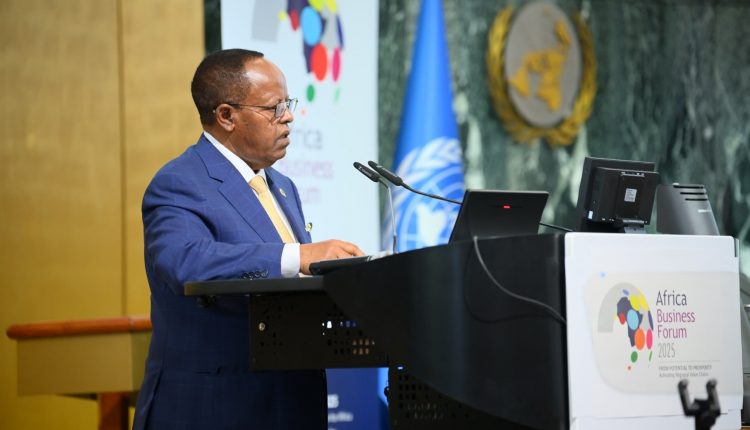Africa must take control of its destiny to ensure sustainable prosperity for millions – Pres. Taye
Addis Ababa, February 17, 2025 (FMC) – The Eighth Africa Business Forum kicked off today at the historic Africa Hall in Addis Ababa, under the theme “From Potential to Prosperity: Activating Africa’s Regional Value Chains.”
Co-convened by the Economic Commission for Africa (ECA) and the Africa Finance Corporation (AFC), the Forum brought together policymakers, investors, and key stakeholders from the public and private sectors to explore investment opportunities and address critical challenges regarding Regional Value Chains in Africa.
In his opening remarks, President of Ethiopia Taye Atsekselassie highlighted the importance of creating sustainable value chains to reduce Africa’s dependency on external markets. “The African Continental Free Trade Area is a powerful tool that can unlock the continent’s potential by promoting industrialization and reducing food imports,” he remarked during his address. “Resilient infrastructure, investing in human capital, and embracing digital transformation will be essential to Africa’s growth,” he added.
According to the Ethiopian president, investing in human capital is crucial. “Education, skills development, and innovation are key to driving Africa’s manufacturing sector and regional value chains.
He further added that ‘Resilient infrastructure is imperative to withstand climate change impacts and mitigate future risks.’ Building resilient infrastructure is essential for a sustainable Africa.”
“Addressing resources mobilizing and financing gap is critical,” the Ethiopian head of state underscored, noting that Africa must take control of its destiny to ensure sustainable prosperity for millions
Opening the Forum, Mr. Claver Gatete, Executive Secretary of the ECA, stressed the urgency of strengthening Africa’s value chains to boost the continent’s economic growth and industrialization.
He added: “Africa has a wealth of resources, yet our participation in global value chains remains underdeveloped. This Forum provides the platform to turn potential into prosperity by mobilizing investments into our regional value chains.”
“The AfCFTA is enabling us to overcome trade barriers, fostering partnerships that will elevate the continent’s economies. A prosperous Africa will emerge from our collective efforts to develop strong regional value chains,” underscored Ms. Monique Nsanzabaganwa, Deputy Chairperson of the African Union Commission at the opening. focusing on the strategic importance of regional cooperation to enhance intra-Africa trade and investments.
Delivering his keynote address, Mr. Samaila Zubairu, President and CEO of Africa Finance Corporation emphasized the vital role of infrastructure and financing in realizing Africa’s potential. “Investing in infrastructure, human capital, and technology is critical for creating the foundation for robust Regional Value Chains that can drive the continent’s economic transformation.” He also called for greater private sector involvement to address Africa’s financing gap and unlock opportunities in agro-industrial, livestock, and pharmaceutical sectors.
The opening session emphasized the need for investments in three critical regional value chains that can significantly contribute to Africa’s economic growth. Firstly, the agrifood sector, as part of agro-industrial value chains, presents immense opportunities for increasing intra-African trade, with the potential to reduce Africa’s $60 billion annual food import bill. Secondly, in the livestock sector, investment in beef, milk, and poultry is expected to grow significantly by 2050, creating substantial opportunities for trade and investment. And finally, strengthening Africa’s pharmaceutical manufacturing capacity is crucial for both public health and economic growth, particularly in the aftermath of the COVID-19 pandemic.
Throughout the day, discussions will focus on these value chains, underscoring the importance of creating a conducive environment for investment, job creation, value addition, addressing infrastructure bottlenecks, and developing frameworks for sustainable growth. Experts and stakeholders will explore innovative solutions to overcome challenges and accelerate Africa’s industrialization efforts.

